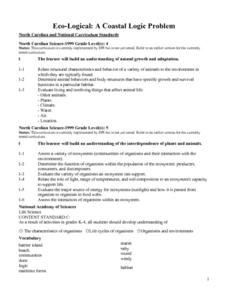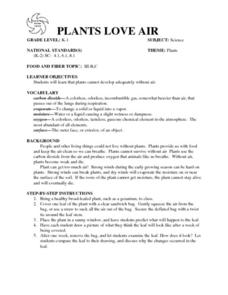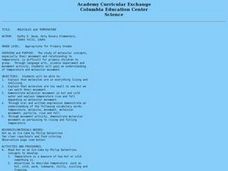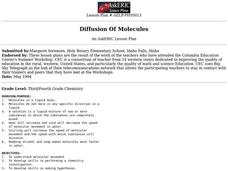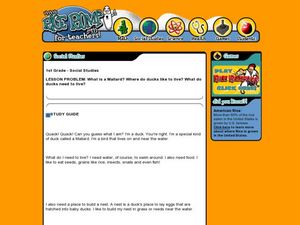Curated OER
Eco-Logical: A Coastal Logic Problem
Fourth graders study the characteristics of five coastal communities. They use logic cards and matching activities to identify the proper community for plant and animal species.
Curated OER
What's The Level?
High schoolers examine the movement of the water table and saturation zones. They describe the movements of the water table and locate the saturation zones. Students identify the function of each saturation zone. They develop a model of...
Curated OER
A Trip To the Animal Fair
Students share their experiences they have had with animals. Using photographs of their own pets, they create a booklet out of construction paper in which they identify the pets needs. They also compare and contrast what they need to...
Curated OER
PLANTS LOVE AIR
Pupils identify that plants cannot develop adequately without air and predict what happens to the leaf of a geranium brought to class. They draw a picture of what they think the leaf will look like after a week of being covered. Finally,...
Curated OER
Natural Features as a Resource
Pupils research how people use land and water features to meet their basic needs. In this natural features activity, students review land and water features. Pupils discuss how the land is used to meet needs using a landscape picture...
Curated OER
Compost Tag
Students identify biodegradable items. For this environmental lesson, students participate in a game of tag. A student's name is called out along with a biodegradable item and the student is tossed a ball.
Curated OER
All That Glitters...
Students study that white light (visible light) is comprised of all colors of the spectrum. They study that the quantity of light decreases with increasing depth in the ocean. They study that the quality of light changes with increasing...
Curated OER
Types of Legs
Students identify the characteristics of the legs of arthropods as well as how they are used. They compare and contrast the legs of various types of bugs in the arthropod family. A comparison worksheet is included in with this lesson.
Curated OER
Escape From the Antlion's Pit
Students draw conclusions about the effectiveness of antlion's pits in catching prey. A brief review of the antlion and its hunting habits is conducted. After watching a video about the use of pits to catch prey, students complete a...
Curated OER
Molecules And Temperature
Students explain that molecules are in everything living and nonliving. They explain that molecules are too small to see but we can watch their movement.
Curated OER
Diffusion Of Molecules
Students investigate molecular movement while studying how to perform a chemistry investigation.
Curated OER
How Do We Learn About the Past?
Sixth graders discuss the role of an archaeologist as a class. After viewing photographs, they relate the objects found in their local area and Ancient Egypt. They draw a picture of an object that represents their own culture and gives...
Curated OER
Building a Mini-park And Bird Sanctuary Lesson 2: Helping Others With a Garden
Students investigate how gardening can help others through sharing by listening to a read aloud of Shea Darian's, Grandpa's Garden. They examine at least three purposes of gardens and their importance to people.
Curated OER
Adapting to Animal Behavior for Survival
Second graders explore animal behaviors and adaptations by researching several different animals and their habitats.
Curated OER
It's in the Garbage
Students analyze how studying garbage relates to methods of archaeology. They examine garbage to determine things about their culture and relate that to prehistoric peoples.
Curated OER
Water Quality
Students investigate the water cycle and evaporation. They study the porosity and permeability of groundwater, and the capillary action in soil in this unit.
Curated OER
Fungal History
Students identify different types of fungi. They discuss how mushrooms are used in American culture and research an issue about a type of fungi. They share their information with the class.
Curated OER
The Window
Students read a story entitled, "The Window," and discover how some cultures are rejected by others. Students write a letter expressing feelings of rejection and keep a journal of significant events in the story. Using a graphic...
Curated OER
WALK, DON'T RUN
1. Bring two quarts of moist soil, a cake pan, a sprinkling can of water and a quart of grass clippings to class.
2. Share background material, and introduce the word "erosion."
3. Prepare a small model hill by mounding the soil in the...
Curated OER
Mallard Ducks
First graders discuss the habitat and needs of a Mallard duck. In this lesson plan on ducks, 1st graders examine what a Mallard ducks needs to survive and the wetland habitat that the duck is usually found in.
Curated OER
AdVENTurous Findings on the Deep Sea Floor
Students conduct investigations to observe formations of precipitates, then create models of developing hydrothermal vents. They compare the models with the actual hydrothermal vents developing along the Galapagos Rift.
Curated OER
Solar Matters
Students design an energy resource wheel and demonstrate how to use it to access information about renewable and nonrenewable energy sources.
Curated OER
Bleach Chemical Reactions
Pupils learn what happens when bleach comes in contact with various cloth fibers, chemical colors, nature and synthetics.
Curated OER
Wolf Pack in a Bottle
Students participate in an activity of a mock electrophoresis using paper chromatography to study DNA and genetic restriction mapping.


